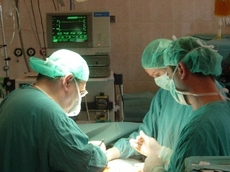Exploring new ways to keep diabetes at bay
A flurry of medical staff is constantly rushing in and out of the surgery at Warsaw's Orlowski hospital, but for a few weeks now it has not just been business as usual for Professor Wieslaw Tarnowski who heads the surgical department. A new surgically implanted device is being tested to help patients control their diabetes, allowing them to live a normal life despite the disease.
"The system we are currently testing has good chances of becoming an important treatment alternative for type 2 diabetes", explains Professor Tarnowski. "It avoids complications that are associated with ordinary diabetes treatment, without forcing the patient to change his or her life completely. If this study proves that the device really works for our patients - which I strongly believe - it will be a kind of revolution."
The study of the novel treatment was made possible with the support of an EIB loan to a consortium of five small and medium-sized enterprises, each engaged in the late stages of developing breakthrough medical devices with a high potential for international commercialisation. Diseases treated in the framework of the Medinvest project range from chronic heart failure and strokes to diabetes and obesity - all conditions that affect a large number of patients globally and entail high health care costs.
A rapidly spreading pandemic
"We expect to see a huge growth in demand for this treatment", says Mateusz Zelewski, sales manager in Europe for the new Tantalus diabetes treatment. In Poland alone around 10% of the population is diagnosed with diabetes and numbers are rapidly increasing. Already now, diabetes treatment tops the national healthcare budget at roughly 8% of total spending. "Europe has to address this issue. We need to find a solution," Zelewski adds.
As one of the most widespread diseases, diabetes remains a worldwide epidemic. In particular, the number of cases of type 2 - obesity related - diabetes has dramatically increased over the years. Type 2 diabetes results from the body's ineffective use of insulin. This type affects 90% of people with diabetes around the world and is largely the result of excess body weight and physical inactivity. Over time, diabetes can damage the heart, blood vessels, eyes, kidneys and nerves. Recent figures are nothing short of alarming. The World Health Organisation estimates that more than 180 million people worldwide have diabetes and that by 2030 this number will more than double.
Helping patients to go back to normal life
The new treatment currently being studied in is helping to get a grip on the disease and makes it possible for type 2 diabetes patients to avoid an insulin treatment. "Many patients are afraid to use insulin because of the risks involved", explains Professor Tarnowski. The steep fall in blood sugar can have severe effects, just as the heightened level of blood sugar brings many health risks. "Tantalus helps them to go back to a normal life."
The Tantalus system allows type 2 diabetes patients to control their blood sugar level and lose weight at the same time. The medical device is implanted in the patient's gastric system, where it sends electric impulses during meals. The impulses communicate a feeling of satiety to the brain, helping the patient to stop eating sooner and prepare the body to better deal with the subsequent rise in blood sugar.
A new financial structure
Medical technology relies on a combination of leading-edge expertise in engineering and clinical practice, which usually requires a substantial up-front investment in research and development. The medical technology industry is dominated by small and medium-sized companies. These smaller players are facing difficulties to fund the expensive later stages of product development, such as the clinical trials.
The Risk-Sharing Finance Facility (RSFF) is a direct answer to this challenge. Together with the European Commission, the EIB has launched this joint initiative to support research and development projects and innovation by sharing the underlying risks.
Medinvest is one of the first of such research projects by the Bank involving several EU Member States and Israel to have received funding. In late 2008 the EIB signed up for this innovative project involving high-risks, but also offering high-value added. Its investment of EUR 30m may be relatively small but the EIB's involvement as an anchor investor played an important catalytic role by attracting and retaining other institutional investors to the deal, especially in the midst of a credit crunch.

